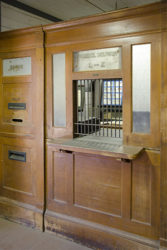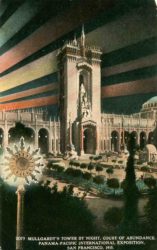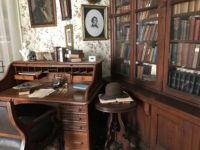
Frederick Douglass (1818 – 1895), African American writer, orator, and social activist, was a gentleman of letters. Born into slavery, he was largely self-taught, learning to read and write prior to entering his teens. His eloquence and fiery oratory gave him great influence as an abolitionist, social activist, and diplomat throughout his adult lifetime.
Last month, on a visit with my daughter in Washington, DC, we had the opportunity to tour Frederick Douglass’s final home, Cedar Hill, located in Anacostia. Douglass, who purchased Cedar Hill from the Freedmen’s Bank in 1877, lived there for seventeen years.
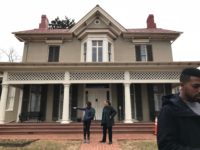
Anacostia is a historic neighborhood, located in the southeast in the District. Our visit started with a brisk 40-minute walk along the Anacostia River. Aside from the occasional jogger, few people were enjoying the river walk on this wintery day, though we did encounter a great blue heron and the ubiquitous flocks of Canada Geese.
Although Frederick Douglass spent much of his adult life in New York and Massachusetts, his Cedar Hill home serves as an ongoing testament to the vision and life of this extraordinary man. A gentleman of letters, his personal study on the first floor of the mansion reflects his love of learning. Leather bound books fill the handsome, dark wood shelves, protected by glass doors. A large roll top desk faces the wall, covered with personal papers, a quill pen and ink, and round wire frame glasses.
In keeping with the painstaking historic renovation of the house, the 19th century wallpapers have been replicated, and the original busts and portraits of famous politicians who became Douglass’s friends and allies cover the walls and pillars.
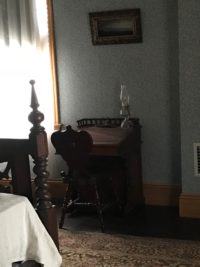
In the accommodations, Douglass also provided for the writing needs of his guests. Along a long hallway, the bedrooms for Douglass, his sons, and male guests include small desks for letter and speech writings. The private room of his second wife, Helen Pitts Douglass, includes both a sewing machine as well as a typewriter.
Our tour guide, a volunteer for the National Park Service, pointed out that Douglass also had a separate, more private writing studio built of stone on the grounds of Cedar Hill called The Growlery. Unlike his formal study, adjacent to the parlor of the main house, The Growlery was simply furnished, with a desk, chair, table and fireplace to keep the structure warm. It was here that Frederick Douglass escaped to think, reflect, and write.
Frederick Douglass was married to Anna Murray Douglass, a woman five years older than he, until her death at Cedar Hill forty-four years later. Murray, as a free woman, helped Douglass escape from slavery and live in the north, in both Massachusetts and New York.
It was in the north that he came in contact with many influential people and gained a name for himself as an effective orator and agitator. Because of his growing reputation, and his status as an escaped slave, his allies and friends advised him to remove himself from harm’s way. He and Anna moved to Europe and spent two years abroad. In Ireland and Great Britain, Douglass continued to speak out against slavery and oppression of all kinds.
Eventually, Douglass and his supporters bought his freedom, so that he was able to return to the United States and continue his work. In keeping with his social activism, he attended the first women’s suffragette convention in Seneca Falls, New York in 1848.
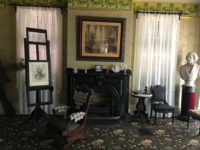
The Frederick Douglass National Historic Site is open seven days per week, 9 a.m. – 5 p.m., EST. Reservations are recommended for tours. Cedar Hill was made available to the public largely due to the efforts of Helen Pitts Douglass, who created the Frederick Douglass Memorial and Historical Association. Today, the National Park Service manages the Cedar Hill home and estate.
While in Anacostia, we also visited the Anacostia Arts Center, a complex featuring a café, vintage store, an arts and crafts shop, a small theater, and a bookstore. Mahogany Books, “dedicated to meeting the literary needs of readers in search of books written for, by, or about people of the African Diaspora,” has an excellent curated collection of books.
The Frederick Douglass National Historic site will celebrate the bicentennial of the birth of Frederick Douglass on February 17 and 18. If you happen to be in Washington, DC this month, Anacostia and Cedar Hill are well worth a visit.
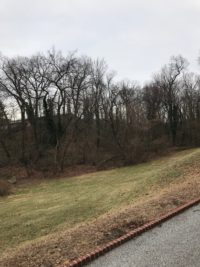
Sources and Further Reading
12 Things to See and Do in Anacostia. Washington.org
Anacostia, Washington, DC. Wikipedia
Anacostia River. Wikipedia
Anna Murray Douglass. BlackPast.org
Cedar Hill. National Park Service
Frederick Douglass. Wikipedia
Frederick Douglass National Historic Site
Freedmen’s Savings and Trust Company. BlackPast.org
The Growlery. National Park Service
Helen Pitts Douglass. Wikipedia
National Park Service. Wikipedia
Seneca Falls Convention. History.com

